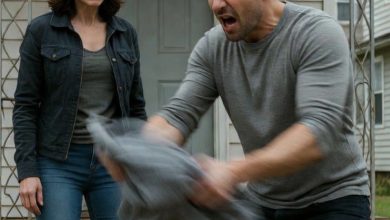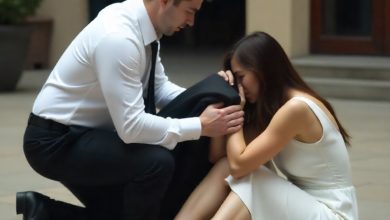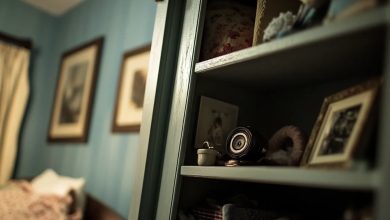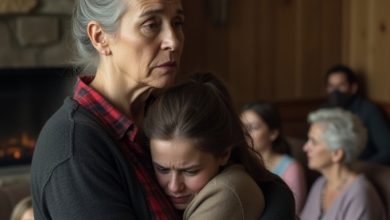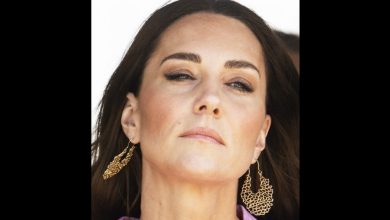She brought home a senior boyfriend, took over my house, and pushed me aside
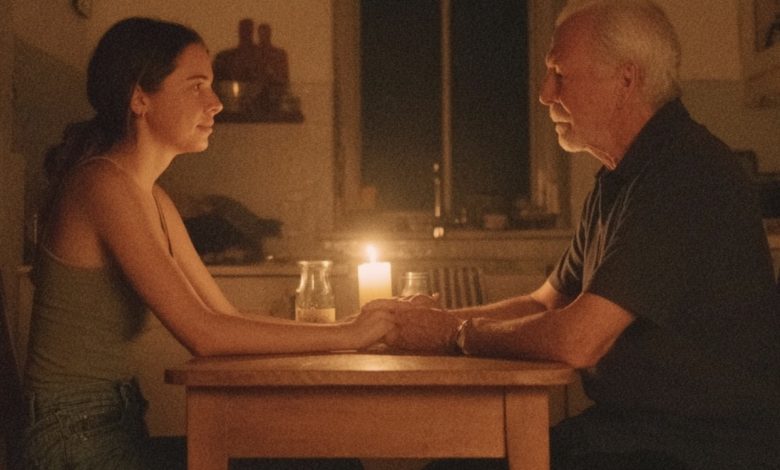
When my husband passed away, our lives shifted in ways I never could have imagined. My twenty-three-year-old daughter, Kayla, came back to live with me six months ago. But instead of acting like a young woman ready to build her own future, she behaved more like a rebellious teenager. She wouldn’t work or study, she didn’t help with chores, and she spent the money I earned without a second thought.
Every morning, I would find her still in bed, her alarm silent beside her pillow. I’d knock on her door and say, “Kayla, breakfast is ready,” but she’d never respond. By the time she finally stomped downstairs, the sun was high in the sky and I’d already finished my coffee alone.
I tried to be patient. I reminded myself that losing her dad was hard on her too. Maybe she needed time to grieve. So I offered to talk, to sit quietly with her, to help her find a counselor or a support group. Each offer was politely declined with a shrug and a mumbled “I’m fine, Mom.”
Then the funeral flowers incident happened.
My husband always loved white lilies. They were his calm-down flowers, he’d once said, their quiet beauty a comfort in dark times. So when the funeral arrangements began, I handed Kayla cash to buy lilies for his coffin. I pictured her walking into the florist, carefully selecting dozen after dozen of pure white blooms.
Instead, when I went to check on her, I discovered she’d used that money at a tattoo studio. In its place was a bold black panther inked across her collarbone, mouth open in a silent roar.
I stood in the hallway, my hand pressed to the wall to keep from falling. “Kayla,” I said, voice shaking, “you were supposed to buy lilies for your father. You spent that money on… this?”
She didn’t flinch. She pulled her shirt down to show off the new ink. “I spent time with him when he was dying,” she said coolly. “I was there for six months. You were too busy working. If you want a symbol of love, here it is. He would’ve understood.”
I felt tears burn my eyes, but I swallowed them down. “Respect,” I choked out. “That’s what you owe him. Flowers are a simple act of respect.”
“Mom, stop the drama,” she shot back. “He’s gone. I don’t need your rules anymore. I’m an adult.”
I took a step forward. “If you’re an adult, start acting like one. Buy your own things. Pay your own way.”
She rolled her eyes. “Fine. See you at the funeral. I promise—it’ll be a day you won’t forget.”
Her words felt like a challenge. At the time I brushed them off as teenage drama, but looking back, they were a warning I chose to ignore.
The day of the funeral arrived, and the house felt silent and strange without him. I stood in front of the mirror, smoothing the lapel of my black coat. “Today, we say goodbye,” I whispered to myself, pressing a small white rose against my chest.
By noon, the university chapel was full. Former students, colleagues, friends—everyone who’d known my husband came to pay respects. I greeted them with polite smiles and handshakes, but inside I felt hollow, as though a piece of me was missing.
I waited for Kayla. Her seat was empty, and every minute that passed made my heart thud faster in my chest. I imagined her walking down the aisle, tears in her eyes, placing lilies gently on the coffin. Instead, the priest finished his prayer, and I was about to stand and step toward the graveside when the side door creaked open.
All heads turned. I stood frozen. Kayla appeared in the doorway, but she wasn’t alone. Wrapped around her arm was a tall, silver-haired man in his sixties. He wore a quiet smile and carried himself with gentle confidence.
“Kayla,” I managed to whisper, standing up so abruptly I nearly stumbled. “What are you doing?”
The man gave me a polite nod. Kayla leaned close and said, “Mom, this is Archibald. He was one of Dad’s good friends from university. He’s my boyfriend now.”
Gasps filled the room. I sank back onto my seat, stunned. The priest paused, the choir stopped singing, and for a moment the world held its breath.
Archibald stepped forward, clearing his throat. “Mrs. Reynolds, I’m truly sorry for your loss,” he said softly. Then he looked at Kayla. “I’ll wait outside. Give the family a moment.”
He left, and Kayla took her seat beside me, looking smug. I stared at her, my mind racing. Finally I whispered, “He’s sixty-three.”
She shrugged. “He treats me like an adult. He listens. He understands grief in a way you never did.”
I didn’t argue. The chapel service ended soon after, and we filed out into the bright daylight. The procession wound its way to the gravesite. I stood by the coffin, lily-white tears mingling with rain that began to fall.
When we reached the graveside, Kayla stepped forward. She cleared her throat and said, “I’d like to say something.”
I squeezed her hand, thinking she’d share a loving tribute. Instead, she said, “My father was the kindest man I’ve ever known. He never judged, he never pushed his will on me. He listened, and he loved freely.”
My chest tightened. She paused, looking at me with fierce eyes. “He always told me to live authentically, to be brave. So I’m not going back to college next year. I’ve found love in Archibald. We’re moving in together—right into this house.”
The rain stopped, and an ice-cold hush fell over us. Someone in the back whispered, “Into her mother’s home?”
She gave a small wave, bowed, and turned away. That was it—no apology, no goodbye. She slipped through the crowd and walked off with Archibald as the funeral ended around us.
The next morning, I woke to unfamiliar noises: laughter and clinking dishes on the porch. I stepped outside in my robe and found Kayla seated at the picnic table, pouring tea for herself and Archibald. Candles flickered on the tabletop, and a colorful plate of couscous salad sat between them.
“Good morning,” Kayla chirped. “We thought we’d have a mindful breakfast. Archibald taught me how to breathe before each bite.”
I blinked. “I thought you were leaving today.”
She smiled. “We’re staying. Dad would’ve wanted our family under one roof.”
I fought the urge to cry. “You can’t just move in. This was our home—your father’s home.”
Archibald stood and bowed politely. “Mrs. Reynolds, please allow us some time. We’re grateful for your hospitality.”
I wished he’d stop calling me “Mrs. Reynolds.” It was as if he refused to see me as a real person, just the widow he had to be polite to.
Over the next days, Kayla and Archibald made themselves at home. They rearranged the furniture, stacked boxes in the living room, and even painted the spare bedroom a soft sage green. Every time I passed the hallway, I caught glimpses of their things: his worn books, her bright throw pillows.
I tried to keep busy—gardening, cleaning, visiting friends. But each time I returned home, they were there, sitting together on the porch bench like an old married couple. Kayla laughed at his jokes, and he listened with soft eyes.
One evening, I stepped into the backyard to water my lavender. The night air was cool, and the only light came from the moon and a single porch bulb. I heard voices—Kayla’s gentle tone and Archibald’s measured reply.
“…This feels strange,” Archibald said. “I came back to help you after your dad got sick. I never imagined we’d be playing husband and wife.”
Kayla sighed. “I know it sounds crazy. But Mom needed to see me happy. And I needed someone who wouldn’t judge my grief.”
He paused. “But what about you? Is this what you really want?”
She was quiet for a moment. Then: “I wanted Mom to step back once. To let me breathe. I thought if she saw me with someone she respected, she’d finally trust me.”
I felt a knot in my stomach. I stepped closer to the hedge, my heart pounding. And then I decided I couldn’t stay hidden any longer.
I cleared my throat. They both jumped, turning toward me. Kayla’s eyes widened; Archibald looked embarrassed.
“Mom…” Kayla said.
I held up a hand. “I’m listening.”
The three of us stood there under the moonlight—daughter, father’s friend, and grieving widow. For the first time, I felt I might understand why Kayla had done what she did, even if I didn’t agree with it.
But that night changed everything. What happened next would teach me more about grief, control, and love than I ever expected…
I stepped out of the shadows into the soft garden light. Kayla’s eyes widened, and Archibald’s polite composure flickered for a moment.
“Mom…” Kayla began, but I held up a hand.
“I’m listening,” I said, my voice steadier than I felt.
Her defiance softened into uncertainty. Archibald, clearing his throat, spoke first.
“Mrs. Reynolds, I owe you an explanation,” he said, bowing his head. “I never intended to deceive anyone. I came back to help Kayla after your husband fell ill. He asked me to support her through her grief and keep her on track for university.” He glanced at Kayla. “That was my promise to him.”
Kayla’s shoulders slumped. “I—I’m sorry, Mom. I got carried away. I was angry, and I wanted to prove I could make my own choices. But I twisted it into this”—she gestured between them—“a stunt. I thought if you saw me living with someone you respected, you’d finally let me breathe. I didn’t mean to hurt you or to pretend Archibald and I were in love.”
I felt tears prick my eyes. All this time, I’d believed I was fighting a fantasy relationship. Instead, I’d been fighting my daughter’s pain and confusion.
Archibald nodded gently. “We—Kayla and I—arranged this to help her find purpose and motivation. She wasn’t sleeping, eating, or planning for her future. I offered a place, a routine, tutoring for her entrance exams. The ‘boyfriend’ story was my mistake: a way to dramatize the change and get her to commit. It went too far.”
A hollow ache in my chest eased as anger gave way to relief—and sorrow for us both. I took a shaky breath. “Kayla,” I said, stepping closer, “I’m so sorry I pushed you. I thought I was helping, but I forgot to listen.”
She blinked, tears now in her eyes. “I’m sorry too, Mom. I missed Dad so much… and I felt like nothing I did mattered.”
I reached out and hugged her. Archibald quietly stepped back, tipping an imaginary hat before slipping away into the house to leave us mother and daughter under the blooming jasmine.
We stood in silence, the night air cool around us. Finally, Kayla whispered, “Can we start over?”
“Of course,” I said, voice thick. “Let’s go back inside. We’ll make a proper plan—for cleaning, for classes, for moving forward.” I managed a small smile. “And I promise I won’t turn into the fun police.”
She laughed softly, and we walked back together. The house no longer felt like a battleground but a place ready to be rebuilt—brick by brick, memory by memory.
That night, we cleared out the spare room, turning it into her study nook with a new desk and lamp. I apologized again for my impatience; she thanked me for not giving up on her. We shared a late supper of comfort soup and talked about courses, future goals, and even wedding bells—this time, the kind she might plan when she’s truly in love.
In the days that followed, Kayla dove into her exam prep with Archibald’s help—no lessons on love, just math problems and essay outlines. I joined a grief support group, finding my own path forward. And though we still missed Jack every day, our home filled again with laughter, purpose, and the simple peace of being understood.
Life is never a straight line, and grief never ends neatly. But sometimes, it takes a little chaos—and honest conversation—to find your way back to each other.



